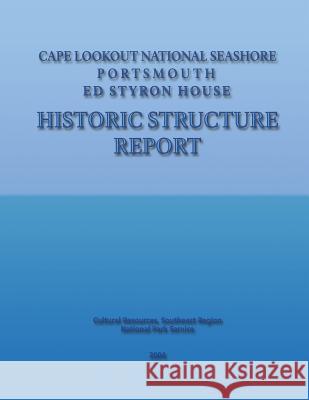Cape Lookout National Seashore, Portsmouth - Ed Styron House Historic Structure Report » książka
Cape Lookout National Seashore, Portsmouth - Ed Styron House Historic Structure Report
ISBN-13: 9781482076295 / Angielski / Miękka / 2013 / 52 str.
The Ed Styron House is a small, two- room house and one of only twenty historic structures remaining in historic Portsmouth Village in the Cape Lookout National Seashore. The house was leased as a temporary lodge for hunters and fishermen under one of the park's special use permits until 1989 but has been vacant and deteriorating since that time. Whatever its historical and architectural significance, the mere presence of the house upon the Portsmouth landscape is critical, given the small number of historic structures that remain in the village; with repairs the Styron House could again be useful. The 1982 historic resource study of Cape Lookout provides extensive documentation for the eighteenth and nineteenth century history of the village but very little for the twentieth century. Most of what is known about twentieth- century Portsmouth in general, and the Ed Styron House in particular, has come from the park's compilation of oral interviews with former residents and descendants of those who lived in the village. Additional research in early twentieth century Federal censuses, county records, and other sources would be useful for interpretation of the Styrons' lives and their contributions to village life. Founded in 1753 near Ocracoke Inlet, Portsmouth played a critical role as a seaport for over a hundred years, until Hatteras Inlet was opened by a storm in 1846 and provided a more convenient channel into Pamlico Sound. Evacuated during the Civil War, Portsmouth never regained its vitality as a port; in the late nineteenth and early twentieth centuries, the village economy revolved around hunting and fishing. The population declined from more than 600 in 1860 to 227 in 1880 and continued to decline after that. A hurricane in September 1933 severely damaged Portsmouth and, after that, "everybody just left," according to one former resident. The Styrons' old house was damaged by this storm, and they built a new house closer to the village center. By 1940, there were only 42 residents left on the island; in 1971, the last permanent residents moved to the mainland.
Zawartość książki może nie spełniać oczekiwań – reklamacje nie obejmują treści, która mogła nie być redakcyjnie ani merytorycznie opracowana.











